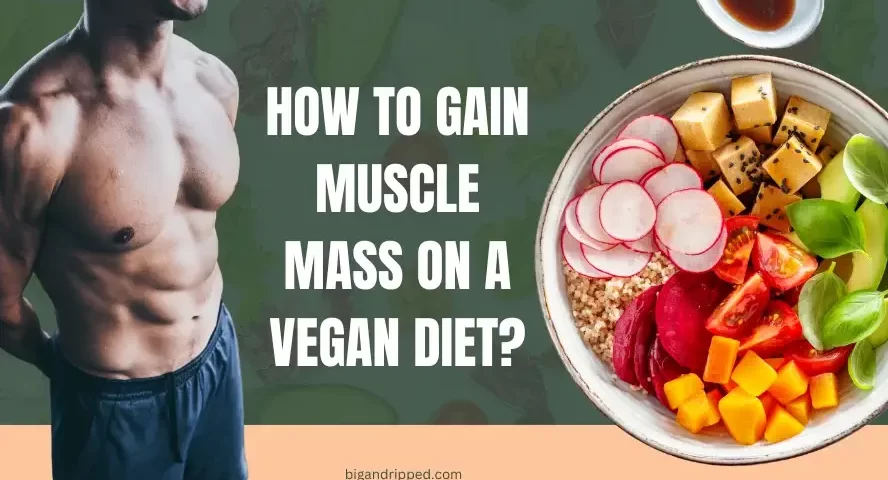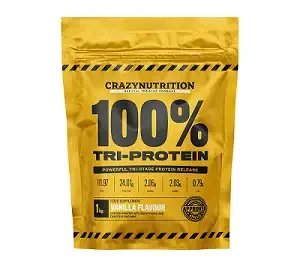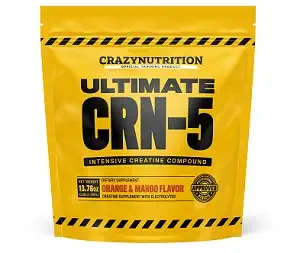- Have any questions?
- hello@bigandripped.com
5 Essential Strategies to Maximize Muscle Building on a Vegan Diet

If people are telling you to switch to an animal diet to attain a muscular physique, they probably have no idea at all about how to gain muscle mass on a vegan diet.
Well, it’s not completely their fault; most people are unaware that it is possible to build muscle mass on a vegan diet.
Though it may be a little harder than building muscle on an animal protein, it is certainly not impossible.
Veganism is on the rise with every 3.25% of adults above 15 years following veganism. A diet rich in animal-based products may not be suitable for everyone either physically or morally.
However, this doesn’t mean you can’t get the toned and bulky physique of your dreams. It is possible to maximize muscle gains on a plant-based diet.
All you have to do is focus on how to fulfill the muscle growth requirements through vegan sources. In this guide, we’ll discuss 5 essential strategies to maximize your muscle-building potential on a vegan diet.
Key Notes
Table of Contents
- Muscle building can be tough but not impossible to achieve on a vegan diet.
- One needs to focus on macros, nutritional deficiencies, and dietary supplementation to maximize benefits.
- There are vegan sources of proteins, carbohydrates, fats, calcium, and other essential nutrients that need to to included in the vegan diet.
- One can also include supplements for accelerating muscle building while still being on a vegan diet.
How to Gain Muscle Mass on a Vegan Diet?
To get the benefits of a vegan diet for muscle gain, you need to focus on certain specifications.
The key is to get enough macros, avoid vitamin and mineral deficiency, and include certain dietary supplements.
While animal protein is scientifically backed to help with lean muscle mass, a plant-based diet is good for reducing body fat.
So, building muscle mass on a vegan diet requires strategic planning and a commitment to well-rounded nutrition.
That being said, here are some challenges that are meant to be overcome to find out how to gain muscle mass on a vegan diet meal plan.
#1. Eat Enough Protein
Protein is the cornerstone of muscle muscle-building process. This essential amino acid is needed to repair and increase muscle mass through the process called muscle protein synthesis.
It is a common misconception that only animal-based products can provide protein for muscle mass. However, contrary to this belief, vegans can also easily meet their protein requirements through plant-based sources.
It is recommended to take 1.4-2.4 grams or 0.042-0.084 ounces of protein per pound of body weight. Those following a vegan diet need to concentrate on consuming a high variety of plant protein foods.
Vegan sources of protein
Some of the plant-based foods contain all essential amino acids and are hence called ‘complete proteins’. These foods include tofu, tempeh, edamame, quinoa, and chia seeds.
One can also include buckwheat which includes 13.3 of protein per 100g and Seitan with 24g of protein per 100g.
A well-planned vegan muscle-building diet plan can provide all the protein and energy that your body needs.
#2. Focus on Other Macros Too
While protein is crucial, don’t overlook the potential of carbohydrates and fats. Carbohydrates provide energy for workouts while fats support healthy hormone production.
Choose good carbohydrates that are high in fiber and low in calories.
Not having enough carbs can also affect the protein and may cause its loss because restricting protein can cause nitrogen excretion which is crucial for muscle protein synthesis.
Talking about fats, it is important to consume plenty of healthy fats too. While vegans often mistakenly overdo omega-6 fatty acids, it may cause inflammation, and thus it needs to be balanced with omega-3s.
Adding to it, cut back on saturated and unsaturated fats. Stay within the limits of 0.5–1.5 grams per kilogram of body weight per day and you are good to go.
Vegan sources of macros
For the vegan sources of macros, include non-starchy vegetables like green beans, zucchini, mushrooms, and squash.
For healthy fat sources, try to include olive oil, avocado, nuts, and seeds. Avocados are also a great source of healthy fats.
#3. Calculate Calories
To gain muscle mass, you need to be in a caloric surplus, meaning you consume more calories than your body expends.
Calculate your daily caloric needs and aim for a modest surplus to support muscle growth.
For those on a vegan diet, it is important to consider that they should fulfill their calorie surplus from protein, carbohydrates, and fats.
Notably, for an average weight gain of 0.25-0.5% of your body weight experts recommend 10-20% above your daily weight maintenance calorie needs.
You can also include online calorie calculators or consult a nutritionist for a modest surplus to support muscle growth.
Since plant-based foods are typically lower in calories than animal-based foods, vegan muscle-building may require a little more planning.
You need to customize your muscle-building vegan recipes to achieve the optimal balance of macronutrients. Also, make sure that your body receives the necessary fuel that is enough for strength and recovery.
Try to include some of the common high-calorie vegan foods like nuts, nuts better, tahini, legumes, and avocado.
#4. Pay Attention to Vitamins and Minerals
A vegan diet while rich in many nutrients, may lack certain vitamins and minerals essential for muscle growth.
It is important to pay attention to Vitamin D, B12, calcium, and iodine for addressing potential nutritional gaps.
Vitamin D
It is essential for bone health and muscle function. Notably, vitamin D is also crucial for testosterone production which is important for muscle building and gains. It is recommended to stay outdoors and include vitamin D-rich foods, and vitamin D2 and D3 supplementations.
Vitamin B12
It helps metabolize proteins and fats. However, there are rarely any vegan sources of vitamin B12. Therefore, vegans need to supplement with vitamin B12 and consume fortified foods like plant-based milk, and nutritional yeast.
Calcium
Getting enough vegans might be an issue for vegans because of no dairy products. Even though the amount of calcium in vegan sources is limited, try to include blackstrap molasses, seaweed, whole grains, seeds, and certain nuts.
Iodine
Iodine is also essential for making and promoting muscle growth. Though this trace element is naturally present in a lot of foods, around 74% of adults are still deficient in iodine. Try to include iodine-fortified foods, iodized salts, or seaweed.
#5. Dietary Supplementation
Even those who are not vegan need to supplement their diet with dietary supplements to accelerate the muscle-building process.
Vegans should also consider supplements to fulfill the nutritional deficiencies and enhance muscle-building efforts.
1: Caffeine
It is a natural stimulant that enhances strength and muscle growth. Caffeine is also used to boost the metabolism. It is often included in the pre-workouts to maximize the workout performance.
Caffeine acts on the central nervous system and leads to increased alertness and reduced perception of effort during physical activity.
Caffeine also increases the release of fatty acids from fatty tissues promoting its utilization in energy production.
A lot of muscle-building supplements include caffeine as their primary ingredients.
D-Bal Max is among such muscle-building products which include 200mg of caffeine per serving.
It is not wrong to say that most of the D-Bal Max results and customer reviews are the outcomes of caffeine and other ingredients in its blend.
2: Creatine
It is naturally present in certain foods and is also synthesized by the body. It increases energy availability and also contributes to enhanced muscle contribution and workout performance.
Creatine is also important for cell hydration to create a more anabolic environment.
Creatine supplementation may help decrease myostatin levels, potentially allowing for greater muscle growth by lifting this natural inhibition.

CRN5 by Crazy Nutrition is used by a lot of bodybuilders for creatine supplementation.
Crazy Nutrition’s Ultimate CRN-5 is loaded with 5 potent creatines + electrolytes to support the perfect anabolic environment.
Ultimate CRN-5 before and after results include better muscle repair and recovery, enhanced performance, and muscle hydration, CRN-5 results are experienced by professionals and athletes.
3: Protein Supplements
Supplementing with protein is a common practice among bodybuilders. An increase in protein intake is essential for muscle growth and repair.
High-quality protein supplements often provide a complete amino acid profile, including essential amino acids that the body cannot produce on its own. They can be added to various recipes, such as smoothies, oatmeal, or baked goods.
However, including protein supplements like Crazy Nutrition Tri-Protein allows for strategic protein intake around workouts.
Supplementing Tri-Protein can support muscle growth and recovery and is crucial for sustaining muscle-building efforts, as protein is a fundamental component of muscle tissue.
According to Tri Protein reviews, it is one of the best protein supplements that help bodybuilders with an array of benefits including enhanced muscle mass and energy.
Getting the desired muscle mass is possible with a vegan diet with careful planning and attention to nutritional details.
Conclusion
Consistency is key in the vegan muscle-building journey.
By embracing a thoughtful and well-planned approach to nutrition, anyone can achieve muscle mass goals on a vegan diet, demonstrating the compatibility of plant-based living with robust physical development.
By prioritizing protein intake, balancing macronutrients, calculating calories, addressing vitamin and mineral needs, and incorporating supplements, one can achieve muscle-building goals while adhering to a plant-based lifestyle.
Embrace the power of plant-based nutrition and witness the transformative potential it holds for your physique and overall well-being.


